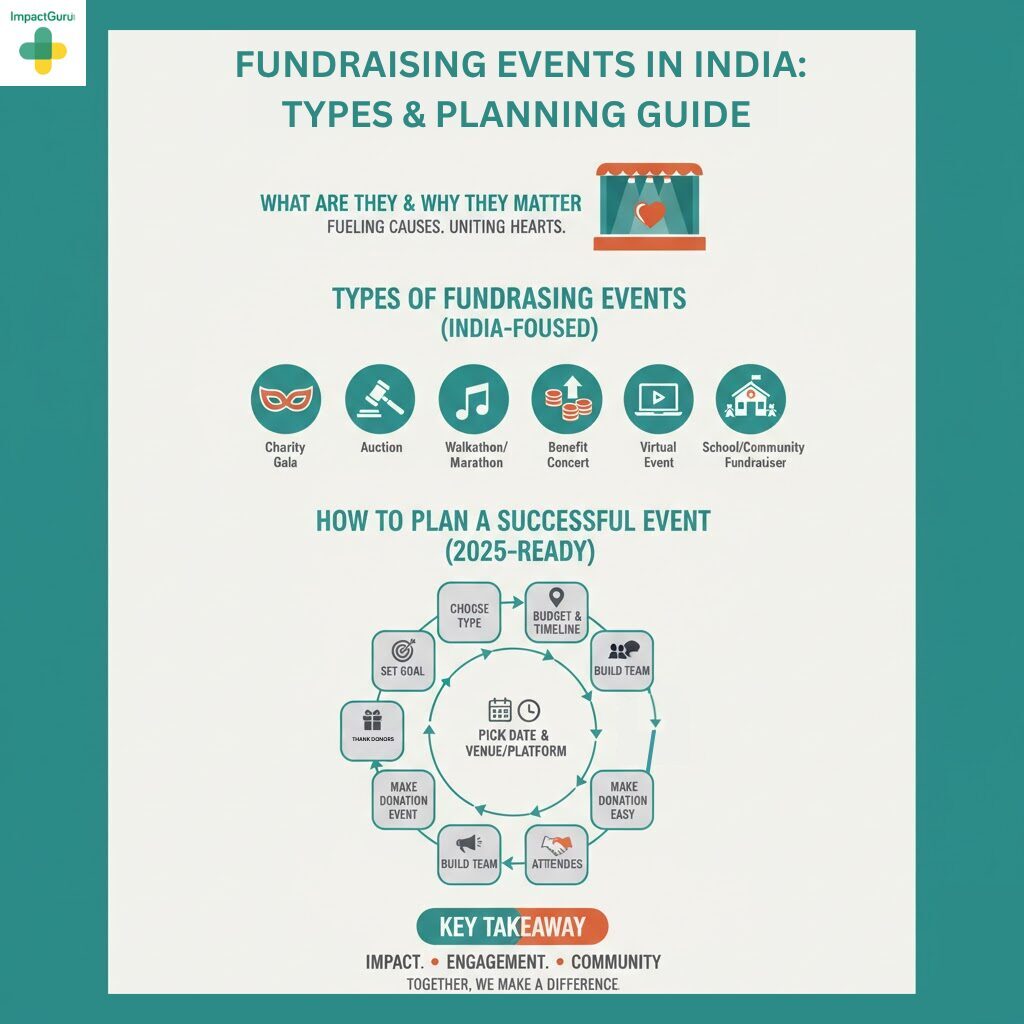Fundraising is the heartbeat of every nonprofit and community initiative. Whether you’re a small local group or a well-established NGO, raising funds is crucial to sustaining your mission’s activity and impact. Unlike government-supported programs, many nonprofits rely on public generosity to sustain important work in education, healthcare, and community development — and that’s where fundraising events make all the difference.
A well-planned fundraising event not only boosts donations but also builds awareness, deepens engagement, and strengthens community relationships. For organizations across India, combining creative fundraising ideas with online platforms like ImpactGuru makes it easier to reach wider audiences and turn limited resources into long-term social impact.
Table of Contents
What Are Fundraising Events and Why Do They Matter?

Fundraising events are organized activities hosted by nonprofits, charities, community groups, or individuals to raise money and awareness for a specific cause. These events serve a dual purpose — they collect donations while also building deeper engagement with supporters. Whether large or small, every fundraiser aims to create a meaningful experience that inspires people to give, participate, and stay connected to the mission.
Common types of fundraising events in India include charity walks, benefit concerts, auctions, gala dinners, bake sales, virtual challenges, and online crowdfunding campaigns. Each event is designed around a clear goal — whether it’s to raise funds for medical treatment, support NGO initiatives, or gather emergency relief funds during times of crisis.
What makes these events powerful is their ability to connect donors directly with the mission. When people attend, volunteer, or donate, they don’t just give money — they feel part of the story. This emotional connection often leads to recurring contributions, volunteerism, and long-term community support

Types of Fundraising Events: Ideas That Inspire Giving in India
Fundraising events come in many forms, each offering unique ways to engage donors, raise awareness, and collect funds. Whether you’re managing a large nonprofit, an NGO, or a community initiative, choosing the right event type is key to your success.
Here are some of the most popular and effective fundraising event ideas in India:
1. Charity Galas
Elegant and formal, charity galas are one of the best creative fundraising ideas for engaging high-value donors. These events often include dinner, entertainment, guest speakers, and live auctions, making them perfect for building relationships and showcasing your nonprofit’s achievements.
2. Auctions (Live, Silent & Online)
Auctions allow participants to bid on donated items or services.
- Live auctions: Involve an auctioneer and audience participation.
- Silent auctions: Attendees bid quietly using forms or mobile apps.
- Online auctions: Broaden reach and are cost-effective.
Each format adds excitement while directly supporting your cause.
3. Walkathons & Marathons
These community-driven fundraising events combine fitness with philanthropy. Participants raise funds through sponsorships while promoting health, unity, and awareness for the cause.
4. Benefit Concerts
Partner with local or well-known artists to host a concert that combines entertainment with impact. Sell tickets or accept donations during the event. Benefit concerts attract music lovers who want to support a mission with meaning.
5. Crowdfunding Campaign Launch Events
Kickstart your online fundraising campaign with an in-person or virtual launch event. These gatherings build momentum, attract early donors, and create social proof that inspires others to contribute.
6. Virtual Fundraising Event
Virtual events offer nationwide reach and low overhead costs. Examples include webinars, live streams, online challenges, and virtual auctions. Since the pandemic, these have remained among the most effective fundraising ideas in India.
7. School or Community Fundraisers
Simple yet powerful, these grassroots fundraising events include quiz competitions, fairs, talent shows, and tree-planting drives. They help local communities participate while keeping costs low and impact high.
In addition to in-person events, many individuals and NGOs now rely on medical crowdfunding in India to raise funds for treatments, surgeries, and emergency relief. Platforms like ImpactGuru make it easy to start fundraisers online, ensuring transparency, speed, and trust during critical times.
How to Plan Successful Fundraising Events in India (2025)
Having great fundraising ideas is only the beginning — strategic planning and flawless execution are what make an event successful. Whether you’re organizing a charity auction, medical crowdfunding drive, or NGO fundraiser, here’s how to plan it effectively:
1. Set a Clear Fundraising Goal
Define how much you want to raise and why. A specific target helps decide the event format, audience, and messaging. Include goals for attendance, donor engagement, and awareness growth.
2. Choose the Right Type of Event
Pick a fundraising event that matches your cause, audience, and resources. Consider season, location, and donor preferences. For example, outdoor marathons work well in winter, while online donation drives suit all seasons.
3. Create a Budget and Timeline
Outline expenses for venue, food, logistics, marketing, and contingencies. Build a timeline with key milestones — vendor bookings, social media promotions, and ticket deadlines.
4. Pick a Date and Secure a Venue (or Platform)
Avoid overlapping with major holidays or events. For physical fundraisers, book your venue early. For online events, use trusted platforms like ImpactGuru for smooth hosting and donation management.
5. Build a Strong Team
Assign clear roles: sponsorship coordinator, logistics manager, emcee, and social media lead. A well-coordinated team ensures smooth operations and reduces last-minute stress.
6. Promote the Event Effectively
Use email marketing, social media, influencers, and press coverage to generate buzz. Highlight your cause, impact, and how donations will help. Create shareable visuals and short videos to boost engagement.
7. Make It Easy to Donate
Simplify giving through online donation links, UPI, or QR codes. If the event supports medical crowdfunding in India, ensure your donation system is mobile-friendly and secure. Add live donation counters or updates to encourage real-time giving.
8. Engage Attendees During the Event
Keep your audience involved with live shoutouts, raffles, impact videos, or real-time donation updates. Show patient or community success stories to build emotional connection and inspire action.
9. Follow Up and Thank Donors
After the event, send personalized thank-you messages, photos, or impact reports. Share how much was raised and how the funds are being used. This transparency builds trust and long-term donor loyalty.
Conclusion: Making Your Fundraising Event a Success in India
Fundraising events are powerful tools for raising money, spreading awareness, and building community support. From charity galas to tree plantation drives, the right event can help you connect with donors and make a lasting impact. Apart from a great fundraising idea, planning it well is essential. Setting goals, choosing the right format, and engaging your audience make all the difference.
If you’re looking for a reliable platform to support your next fundraising initiative, ImpactGuru can help. With its wide reach and 36-lakh + donor base, ImpactGuru empowers individuals and non-profits to raise funds online efficiently and transparently.
FAQs
Some common types include charity dinners, auctions, charity runs/walks, online campaigns, concerts, and benefit performances.
Define your goal (how much to raise), pick a theme, set a budget, choose a venue (or virtual platform), and date.
Use social media, email campaigns, local press, influencer partnerships, and flyers/posters to spread the word.
Challenges include low attendance, insufficient sponsorship, budgeting issues, permit or logistics delays, and last-minute dropouts.
Measure by comparing funds raised vs goal, attendee feedback, social media engagement, sponsor satisfaction, and costs vs revenue.
Fundraising events are organized activities aimed at raising money and awareness for a specific cause, often hosted by nonprofits, charities, or community groups.
Consider themed events like a “Taste of [City]” featuring local chefs, a “Food Truck Frenzy” with various vendors, or a “Silent Auction” with unique items.
Virtual events expand reach beyond local communities, reduce overhead costs, and allow for interactive elements like live streaming and online auctions, making them accessible to a broader audience.












